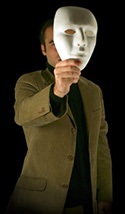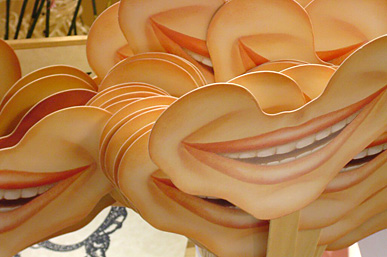Are You a Science Impostor? Self-Help PhD Valerie Young

High achievers, like science graduate students or postdocs, are often thought to be immune to self-doubt. And indeed, some project such unbridled confidence that it is easy to imagine that it is a group trait.
Better think again.
Putting aside such overcompensating fraudsters as South Korean stem cell researcher Hwang Woo-Suk, graduate students and postdocs form a special class of self-doubters, says Valerie Young, a psychology PhD from the University of Massachusetts, who for the last 20 years has circled the country lecturing on her favorite 33-word topic. And what might that topic be?
How to Feel as Bright and Capable as Everyone Seems to Think You Are: What Every Woman and Man Need to Know About Competence, the Impostor Syndrome and the Art of Winging It.
Young recently made back-to-back presentations, courtesy of UCSF's Center for Gender Equity, at UCSF's Parnassus and Mission Bay campuses. At her Genentech Hall appearance, Young regaled an audience of about 80 professional student "impostors" with anecdotes, aphorisms and observations designed to illuminate and reassure.
So who exactly qualifies as an impostor? Young has pooled a series of questions which, if answered truthfully, are designed to pour a little hot water on our waxen public personae.
- Do you secretly worry that others will find out you're not as intelligent and competent as they seem to think you are?
- Do you often dismiss your accomplishments as a "fluke" or "no big deal"?
- Do you sometimes shy away from challenge because of nagging self-doubt?
- Are you crushed by even constructive criticism, taking it as evidence of your ineptness?
"Impostors fear being exposed," says Young. "And they attribute any success they might have had to luck, others' help, others' mistakes or their charm." While Young's at-risk groups range from first-generation professionals to people in creative fields, Young places students — particularly female students — near the top of the list.
"Students can get very stressed out. Sometimes, they will drop out of school because they don't feel deserving," says Young, who admits to once having suffered from ABD, a procrastinating state defined as "all but the dissertation."
For aspiring women of science who — to generalize — lack the "boasting, bullshitting and bragging" experience so critical to a man's ability to wing it in pressure situations, a competitive laboratory environment can ratchet up feelings of failure. "Let's face it," says Young, "when it comes to failures and mistakes, girls internalize and boys externalize. If a woman fails a test, she blames herself. If a guy fails the same test, the professor was stupid."
The riff continues. "If men make mistakes, they only count if they get caught. Women confess."
"Impostorism" is not just a woman's problem, Young acknowledges. Men suffer from it too. "It all comes down to how a person defines what it means to be competent."

To that point, Young singles out six different "expert personalities" that impostors wear like a brittle shell. There is the perfectionist, who wants to live an error-free life; the rugged individualist, for whom success is always a solo endeavor; the expert, who needs to know 150 percent of everything; the natural genius, who thinks intelligence should be innate. Then there is the super student, who needs to sign up for everything and excel incessantly; and the extremist, who feels overcompetent based on only occasional moments of brilliance.
"The sad fact," adds Young, "is that these feelings [of being an impostor] don't subside with success. Success makes it worse because now you have a reputation to defend." And more visibility means more scrutiny and more accountability — scary prospects for the already insecure.
So what to do?
Well, some people cope by covering up, Young explains. "Some people don't let up for a second, fearing everything will fall apart. Others withhold ideas and opinions, or procrastinate. Still others use their charm or perceptiveness to get by, but feel inauthentic for doing so. And then there is always self-sabotage."
There are no magic pills to break the impostor spell, Young warns. But there are common-sense steps that we all can take — such as minimizing procrastination, rehearsing success, faking it until you make it, accentuating the positive, reframing and renaming (failure is merely an opportunity to succeed anew), and many others — which together break the pattern of self-doubt and help us to talk ourselves off the ledge.
Young left her UCSF audience with a parting message. "Separate feelings from facts. When you're a student, you're here to learn. It's OK to feel stupid, but it's not OK to think you're stupid."
I might no longer be a student, but I feel smarter already.
Alternative content
Related Links
- Overcoming the impostor syndrome
- Valerie Young, PhD
- Impostor syndrome
- Wikipedia
- The impostor syndrome
- Inc. Magazine, September 2006
- Impostor syndrome
- Woman's Hour, BBC Radio 4, February 15, 2006